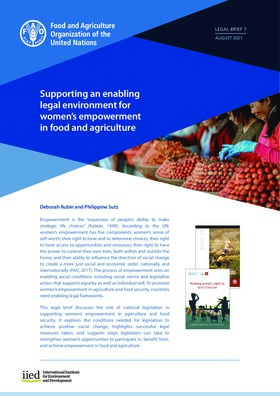Supporting an enabling legal environment for women’s empowerment in food and agriculture
Supporting an enabling legal environment for women’s empowerment in food and agriculture
Empowerment is the “expansion of people’s ability to make strategic life choices”. According to the UN, women’s empowerment has five components: women’s sense of self-worth; their right to have and to determine choices; their right to have access to opportunities and resources; their right to have the power to control their own lives, both within and outside the home; and their ability to influence the direction of social change to create a more just social and economic order, nationally and internationally. The process of empowerment rests on enabling social conditions including social norms and legislative action that supports equality as well as individual will. To promote women’s empowerment in agriculture and food security, countries need enabling legal frameworks.
This legal brief discusses the role of national legislation in supporting women’s empowerment in agriculture and food security. It explores the conditions needed for legislation to achieve positive social change, highlights successful legal measures taken, and suggests steps legislators can take to strengthen women’s opportunities to participate in, benefit from, and achieve empowerment in food and agriculture.

